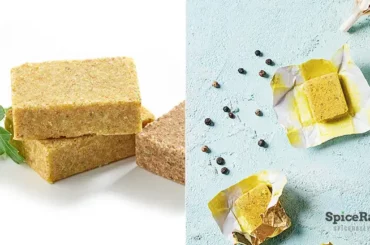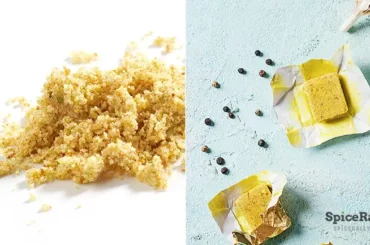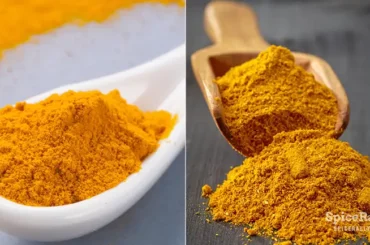Italian cuisine is a place where it gifted so many scrumptious dishes to food lovers. They use a diversity of ingredients, including plenty of Italian spices and herbs, to make their food rich in taste, fragrance, and texture. In fact, it is a place that combines honor for the culture, the expertise of constructing a meal, passion for the ingredients, and love for Italian products.
Italian seasoning mainly contains dried herbs like oregano, basil, marjoram, sage, rosemary, and thyme. Whereas, some variations may include spices such as garlic powder, onion powder, red chili flakes, and fennel seeds. It is an aromatic and flavorful blend of herbs and spices.

This blend of herbs and spices is sort of rich, earthy, and piney in zest with a very subtle sweetness and a trace of minty touch. Thus, we hope to share insights into this flavorsome blend of Italian seasoning that will contribute to savoring many dishes in the way you want!
What Spices Are In Italian Seasoning? The Amazing Herb And Spice Blend
Well, we actually cannot provide this answer in terms of spices. Since the classic Italian seasoning mix is basically a blend of a few herbs widely used in Italy, spices were added only to the variations the chefs created over time. Although the seasoning itself came from Italy, we can see that it is gaining popularity all over the world, especially in American cuisine with American-Italian foods.
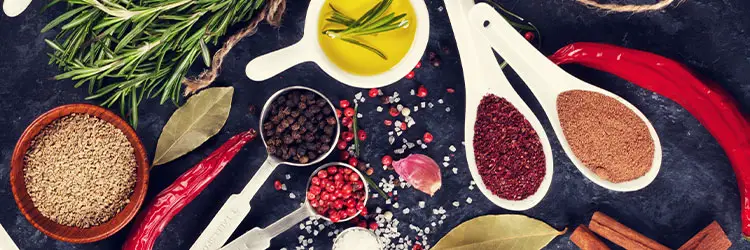
A recipe, whether it is a mix of spices, herbs, or anything that is used to satisfy our taste buds, is something that a person can customize. However, no matter to what extent it gets customized, we should add ingredients to ensure that the original taste will not get ruined. So likewise, home cooks and chefs tend to supplement spices into Italian seasoning to enhance its flavor, texture, and aroma. And, we see that many recent recipes come up with garlic powder, onion powder, red chili flakes, and fennel seeds. So, how would these spices go handy with Italian seasoning? Let us check it out now with facts down below.
Did you know that garlic is a staple in Filipino cuisine? If interested in excavating more information about the essential spices used in Filipino cooking, just click here.
Garlic Powder
Garlic powder, which is essentially used as a seasoning in food preparation, has a distinct taste from fresh garlic. If employed as a replacement for fresh garlic, 1/4 teaspoon of garlic powder equals one garlic clove. This also serves as a carminative and gastric drug in many medical compounds. However, many would be interested in adding this spice to many of their homemade versions of Italian seasonings as it gives a mild garlicky flavor and aroma.
Onion Powder
You can find onion powder as its best companion where garlic powder stands. This flavoring delivers an extra asset that makes it amazingly helpful in the kitchen. It distributes smoothly throughout the dish for a filling, all-over onion flavor. Since onion powder goes so well with garlic powder, some try to include it in Italian seasoning too. It is subtle in taste and is an excellent enhancement to Italian seasoning if you intend on making dishes like meatloaf or meatballs.
Red Chilli Flakes
Combining red chili flakes with Italian seasoning is great if you plan to add it in with pizza. This is the spice that gives this seasoning blend the perfect hotness and sharpness. The spiciness of the chili flakes may depend on the type of red pepper used. And the flavor can vary from sweet to mild to hot. It adds a distinct textural and flavor dimension to a dish without making every bite fiery and spicy.
Fennel Seeds
Not everyone includes fennel seeds in their recipes to make Italian seasoning. But, some add it in order to give a warm, sweet, and earthy flavor to the blend. Usually, fennel seeds are ground in a mortar with a pestle with rosemary before adding it to the seasoning mixture. This flavoring counterbalances the tastes of the other spices added into this.
Note– In addition to these spices mentioned above, you can also customize your own Italian seasoning by adding some salt and black pepper upon your preference.
What Are Italian Spices?
Italian cuisine is a Mediterranean cuisine that has gone in-depth into the diversity of culinary ethics. Accordingly, Italians use an array of spices, except herbs, to flavor and enrich their meals. In fact, their art of combining and blending in the herbs and spices is what makes their dishes so unique and distinctive among foodies all over the world.
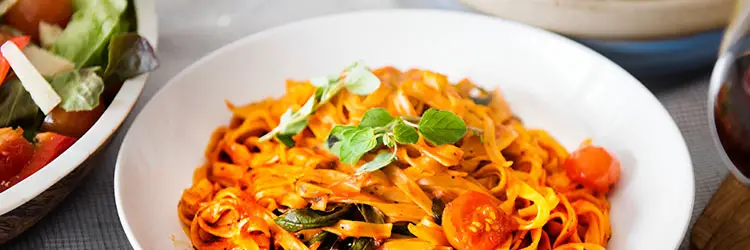
We all know that a tiny sprinkle of spices on your dish can really go a long way. Likewise, Italians also do wonders with their foods by incorporating spices into their dishes. Let us now have a quick glimpse at some main spices used in Italian cooking.
01 – Granulated Garlic/ Garlic Powder
The reason why we put both of these under one topic is that they both come from the same source- garlic. The only variation between garlic powder and granulated garlic is the size of the granules. While granulated garlic is coarsely ground to a sand texture, garlic powder is finely ground to a powder consistency. Both of these spices are staples used in Italian cuisine, and they use these two in most of their seasonings, meat, fish, seafood, pizza, or pasta dishes.
02 – Hop Pepper
Most home cooks and chefs in Italy find their meals to be bland without a hint of hot peppers. Italians call these hot peppers ‘Pepperoncini,’ and it is known for its ability to make people cry with the burning hot sensation! Spicy food enthusiasts add it to practically everything like fish, soups, pizza, vegetable pasta sauces, stews, and egg dishes. In addition, crushed red pepper that you would find on an Italian restaurant counter is obtained from dried hot chili peppers. Also, hot peppers can be processed in oil to produce a flavorsome, spicy oil.
03 – Fennel
Herb fennel, Florence fennel, and dried fennel seeds are not new to Italian cuisine since they have been used since the olden days. Fennel highlights essentially the Italian cuisine, where fronds and bulbs are utilized, both raw and cooked. This spice is included in pasta, side dishes, salads, vegetables, and risottos. Fennel seed is a crucial element in Italian meatballs and sausages. And, it has a distinctive sweet anise flavor that will add a divine touch to many Italian recipes.
While Italian seasoning could complement many dishes, so does the poultry, which has a lot of similarities to Italian seasoning. Click here to discover more about poultry seasoning vs Italian seasoning.
What Is Italian Seasoning?
Italian seasoning is a versatile sweet-smelling seasoning that can be employed for a large assortment of dishes. They can be:
- Spaghetti sauce
- Pasta
- Pasta salad
- Garlic butter
- Meatballs
- Fish
- Seafood
- Chicken
- Pizza
- Salads
- Soup
- As a vegetable seasoning
However, its roots are a bit puzzling, with some people assuming it started in Italy and others declaring it is an American discovery. Yet, the most popular opinion is that the Greeks and Romans originated Italian seasoning somewhere in the Mediterranean through early times. Somehow today, fresh herbs are a standard in Italian cuisine, so the dried herb blend is more prevalent in American or Italian-American home kitchens.
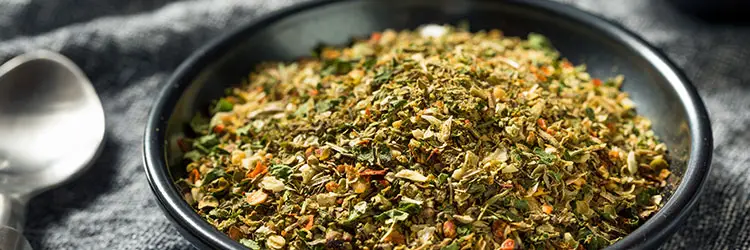
In addition to being marketed as a seasoning in spice jars, Italian seasoning is also included in commodities such as panko, bread crumbs, and croutons. While you can easily buy the ready-made ones from the store, there are plenty of recipes that can help you make your own homemade version of this condiment too. Honestly speaking, Italian seasoning is something that you could add to an unlimited number of dishes according to your choice!
As you see that Italian seasoning is a mixture full of flavors, Creole seasoning is not inferior to this. In order to learn more, click here for the article.
What is in Italian seasoning?
The classic or the original recipe of Italian seasoning actually did not contain any spices, salt, or spicy agents. People tend to make their own versions of the recipe over time, and some of them became really popular even more than the original recipe itself. However, the Italian seasoning generally contains dried herbs like:
- Oregano
- Basil
- Marjoram
- Sage
- Rosemary
- Thyme
In addition to this, as mentioned before, chefs tend to include more flavor enhancers like:
- Parsley
- Garlic Powder
- Kosher Salt
- Chilli Flakes
- Black Pepper
- Onion Powder
- Fennel Seeds
What Herbs Are In Italian Seasoning
Dried herbs are staples found in the Italian Seasoning blend. And in fact, these herbs are the key elements that build up this mixture through the classic recipe. However, none of the chefs took a step to exclude any of them, which safeguards the amazing flavor and texture. Hence, here is the list of dried herbs that are used in this flavorful seasoning. They are:
- Oregano – This herb has complex stability between sweet and spicy. The flavor of oregano is robust and coarse with a petty bitterness.
- Rosemary – Rosemary has a taste that is inconsistently defined as piney, gummy, sharp, pungent, citrusy, and woodsy.
- Thyme – This will have an astringent, nearly minty flavor. It is robust with floral traces and is slightly sweet and spicy. It has a detailed enough tang, so it mingles very well with other herbs.
- Marjoram – This herb has a natural and woodsy flavor, with hints of balsam-like citrus and pine. Mild, sharp, and intense, the taste of oregano and thyme is evocative.
- Basil – With a rich, sharp, and fresh fragrance, basil supplements a piquant, garden-fresh savoriness to the Italian seasoning.
- Parsley – This has a deep, herbaceous, and somewhat bitter punch that works as a variation to accentuate the other tastes in a dish comparable to the lemon flavor.
Tikka masala is one of the most popular spice blends in India. We have an article here if you need to discover more about this spice mixture.
The Ultimate Dash of Seasoning…
Italian seasoning is a great additive to enhance the flavor and aroma of any appropriate dish. Literally, the options available in which you could use this aromatic herb and spice blend are endless. Hence, if you learn about the herbs and spices in Italian seasoning is through our feature, do not waste your time. Just go and grab a jar yourself right now! And, make your favorite dish of pasta, meat, soup, or whatever you want, and sprinkle in some of it to savor the taste and the goodness of an Italian meal.

